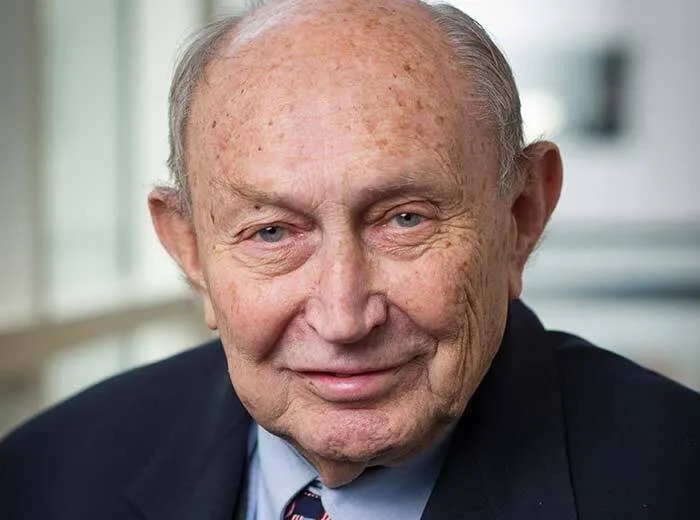Lt. Gen. (ret.) Richard (Dick) G. Trefry died on February 25, 2023, at the age of 98. He was raised in Marblehead, Massachusetts and graduated from Marblehead High School in 1942. He spent a year at Dartmouth College before dropping out of college in 1943 and enlisting in the U.S. Army during World War II. After the war ended, he enrolled at the U.S. Military Academy at West Point and graduated in 1950. After serving in Germany and Korea as an artillery officer, he returned to West Point in 1960 and served as a Tactical Officer in the Second Regiment of the Corps of Cadets.
Lt. Col. Trefry commanded an artillery battalion in Vietnam in 1966. After that assignment, he attended the U.S. Army War College in Carlisle, PA. After graduating from the War College, he assumed command of the Division Artillery, 1st Armored Division, Foot Hood, Texas. In 1973, Dick Trefry was assigned as deputy chief of the U.S. Joint Military Advisory Group in Thailand and served as defense attaché to Laos helping to defeat a coup d’état by its exiled military officers. During his assignment in Thailand, he was promoted to Brigadier General.
As assistant Army deputy chief of staff in the mid-1970’s, Dick Trefry was responsible for overseeing changes in the honor system at West Point after a major cheating scandal. In 1977, he was appointed Inspector General of the Army and promoted to Lt. General. He is credited for reforming the Army’s approach to the annual inspector general inspection by “transforming it from a compliance event into an inspection that identified and corrected systemic failings that inevitably led to recurring deficiencies and interfered with the ability of unit commanders to accomplish their missions.” Dick Trefry served for six years in the Inspector General role until his retirement in 1983. In 1990, he was appointed Military Assistant to President George H.W. Bush and was Director of the White House Military Office during Operation Desert Shield/Desert Storm.
I met Dick Trefry at my first American Public University System (APUS) board meeting in September 2002. He had been a board member of American Military University (AMU) since 1995. Dick was invited to serve on the AMU Board of Directors by his long-time friend, General (ret.) Al Gray, the 29th Commandant of the U.S. Marine Corps.
Dick was a fountain of knowledge about everything related to the military. When we met, he was serving as the Program Manager of the Army Force Management School in Ft. Belvoir, VA, an organization that he founded in 1995. I never served in the U.S. military and learning about it from Dick Trefry was like drinking from a fire hose.
Dick invited me to attend the week-long course offered to new Generals at the Army Force Management School. When I arrived, I noticed that the walls of the building were covered with floor to ceiling charts that began with the earliest authorization of the Continental Army through all the major changes in our nation’s history up until the present. According to Dick, Army training provided generals with leadership and warfare training but not the information that they needed to build the Army and tear it down during national security years and budgetary years. His program was designed to give them a thorough grounding in the legal framework to do that efficiently.
During my visits to the Army Force Management School over the years, I noticed shelves and boxes of books and binders in Dick’s office. These were accumulated from his years of military service. Dick informed me that he had offered his papers to the library and archives at his alma mater, West Point, but their archivist said that they didn’t have room for them. I discussed bringing his papers to APUS, and he agreed to contribute them. The Richard G. Trefry collection formed the basis of the establishment of our university archives under the direction of our librarian emeritus, Dr. Fred Stielow. We digitized Lt. Gen. Trefry’s papers to make them more accessible to military researchers. Later, we dedicated and named our archives after him.
Dick Trefry was a frequent speaker at the U.S. Army War College in Carlisle, PA. I accompanied him several times to listen to his speeches. He nominated me to attend the National Security Seminar, a four-day event where the military leaders and invited guests “examine current national security issues and exchange candid dialogue.” One of the highlights of that week for me was the six-hour tour of the Gettysburg Battlefield narrated by the War College’s experienced historians.
Elected as a senior fellow to the Association of the U.S. Army in 1984. he served in that role up until his death. When that institution’s library was digitized, Dick arranged for the books to be contributed to the APUS library. I attended many AUSA annual meetings with Dick, and he frequently introduced me to his Army colleagues and friends. Over the years, he also donated books from his personal library collection to the APUS library. We honored his contributions by naming our library the Richard G. Trefry Library.
I attended the ceremony at West Point that honored Dick as its 2006 Distinguished Graduate Award recipient. It was my first trip to West Point, and the day that I spent there as his guest was special.
In 2009, the Army created and named a lifetime of service award after him. The inaugural Lt. Gen. Richard G. Trefry Lifetime Service Award was presented to Dick by Secretary of the Army Pete Geren.
There are more awards that Dick Trefry received over his lifetime of service including being bestowed with an honorary doctorate by APUS in 2010 and as trustee-emeritus in 2017. The two and a half decades that he served our institution were notable. When he first joined the AMU Board of Directors in 1995, we were three years old and beginning our shift from a distance education graduate only curriculum to include an upper-level undergraduate curriculum enhanced by online communications between faculty and staff.
Over the years, Dick contributed his advice about military-relevant programs and introduced us to leaders of military schoolhouses where we forged partnerships recognizing military training for academic credit and tightly aligned many of our degree programs with specific military occupational specialties. He also introduced us to retired military officers like Lt. Gen. (ret.) Julius Becton and Vice Admiral (ret.) Ann Rondeau who later served on our board of trustees and board of directors. I cannot remember Dick missing a board meeting during my 18 years of service, and his continued focus on our mission to serve our servicemember students with affordable, quality academic programs was notable.
Dick’s wife of 53 years, Jacque, organized a birthday party at their home for Dick every five years. 
I attended several of them, the last on his 95th birthday, August 3, 2019. Among the notable visitors that year were the surviving West Point graduates whom he served as a TAC in 1960. Many of them traveled from across the country to attend the celebration.
When I heard about Dick Trefry’s death, I notified a few former board members. One of them, West Point graduate Phil Clough, sent me a short note informing me that the West Point alma mater has a stanza that says, “And when our work is done, our course on earth is run, may it be said, ‘Well done! Be thou at peace.’” I can’t think of a better and more succinct response to recognize his substantial accomplishments. Well done, Dick Trefry! May your memory and accomplishments be ever honored!











